
This report provides context for discussions about criminal justice reform, using historical data to reveal trends in Tennessee’s incarcerated and corrections populations. It focuses on Tennessee’s pre-trial detainees — individuals held in local jails before a trial, conviction, or acquittal.
Other reports in this series look at historical trends in Tennessee’s incarcerated populations, the budgetary aspects of incarceration in Tennessee, and community supervision, prison releases, and recidivism for state felony offenses.
Key Takeaways
- In 2018, local jails held about 15,400 pre-trial detainees, or people awaiting trial, conviction, or acquittal for felony or misdemeanor charges.
- Tennessee’s pre-trial detainee population has grown faster than all other state and local incarcerations in the state, accounting for 38% of the growth in total incarcerations from 1991-2018.
- Pre-trial detainees were 51% of Tennessee’s local jail population in 2018, up from 30% in 1990.
- The state does not reimburse counties for housing inmates awaiting trial on felony charges. Pre-trial detention does directly affect the finances of local government and households.
Trends in Pre-Trial Detention
In 2018, local jails held about 15,400 pre-trial detainees, or people awaiting trial, conviction, or acquittal for felony or misdemeanor charges. (1) (2) From FYs 1991-2018, Tennessee’s pre-trial detainee population grew faster (336%) than all other state and local incarcerations (109%) in the state (Figure 1).
Figure 1
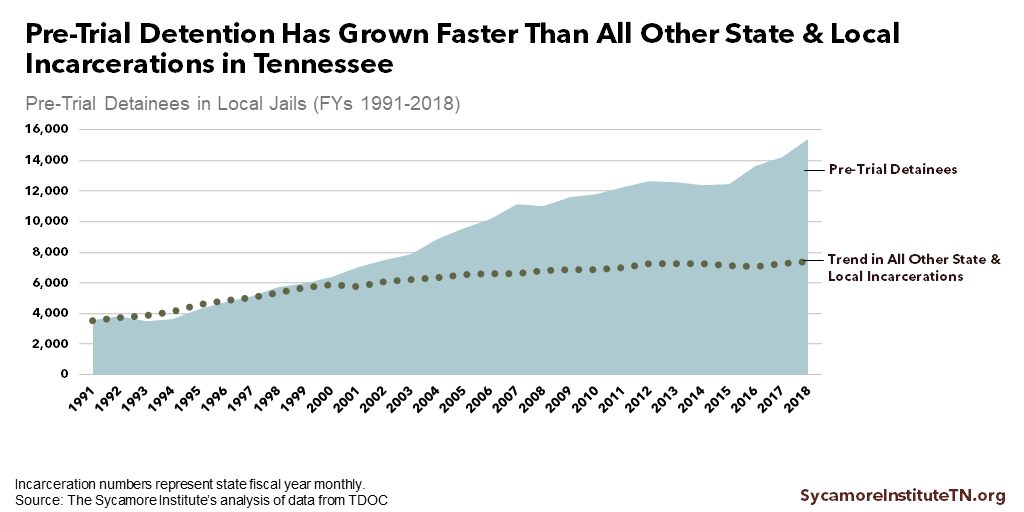
Two-thirds of pre-trial detainees in 2018 were held on felony charges, while the other third were charged with misdemeanors. Both groups have grown faster than convicted incarcerations (Figure 2). From FYs 1991-2018, pre-trial detentions for felonies grew 266% while the state prisoner population (i.e. convicted felony offenders) increased 129%. Pre-trial detention for misdemeanors rose 612% compared to 66% growth in incarceration for misdemeanor convictions.
Pre-trial detainees accounted for 38% of the growth in total incarcerations from 1991 to 2018 (Figure 3). During that period, pre-trial detainees went from 17% of all incarcerations to 29%.
Figure 2
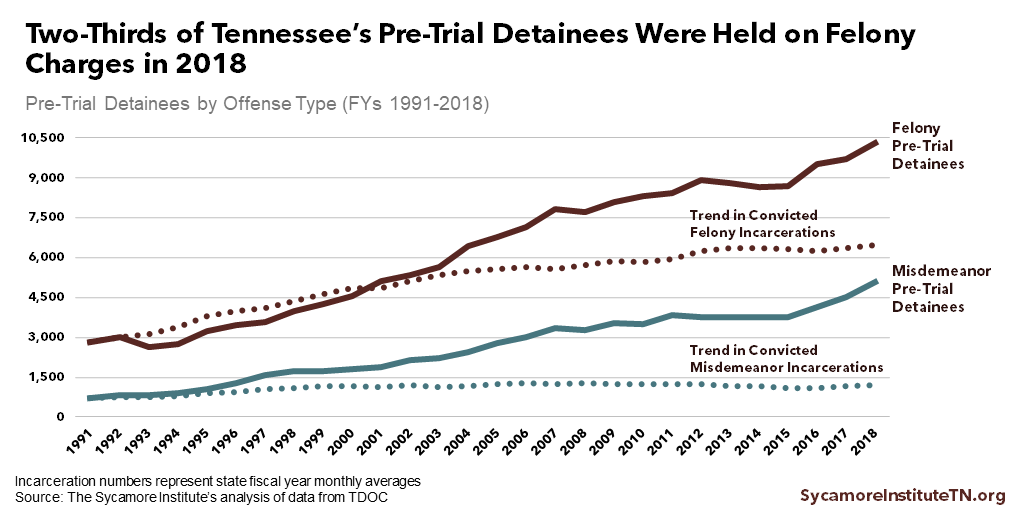
Figure 3
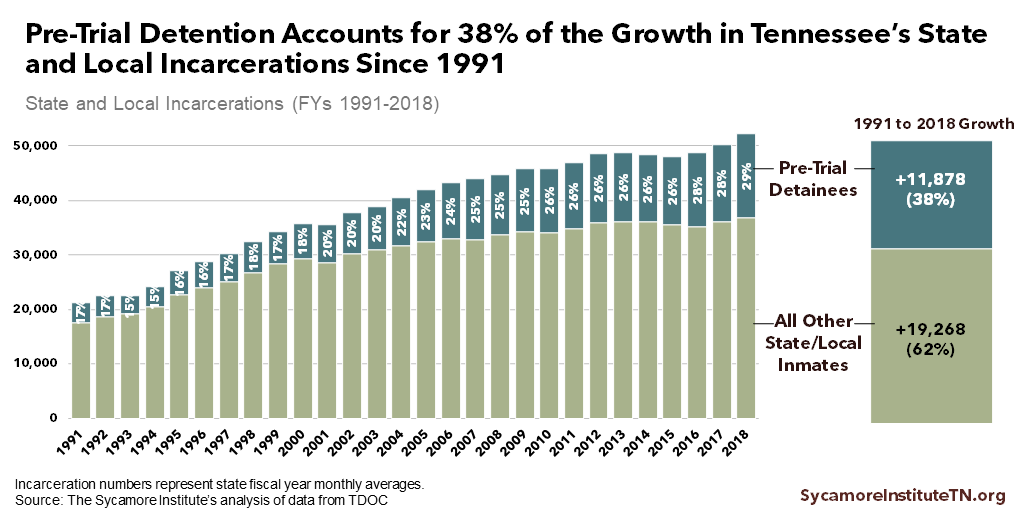
Pre-Trial Detainees Are a Growing Share of Local Jail Populations
Pre-trial detainees were 51% of Tennessee’s local jail population in 2018, up from 30% in 1990 (Figure 4). (1) For context, 65% of local jail inmates nationwide had not been convicted in 2016. (3)
Local jails vary widely in the share of inmates who are pre-trial detainees (Figure 5). For example, a one-day snapshot from July 31, 2018 showed 86% of Meigs County Jail inmates were pre-trial detainees while Henderson County had 26%. (4) Historical data shows that most counties had a higher share of pre-trial detainees in July 2018 than they did in July 2000 (Figure 6).
Figure 4
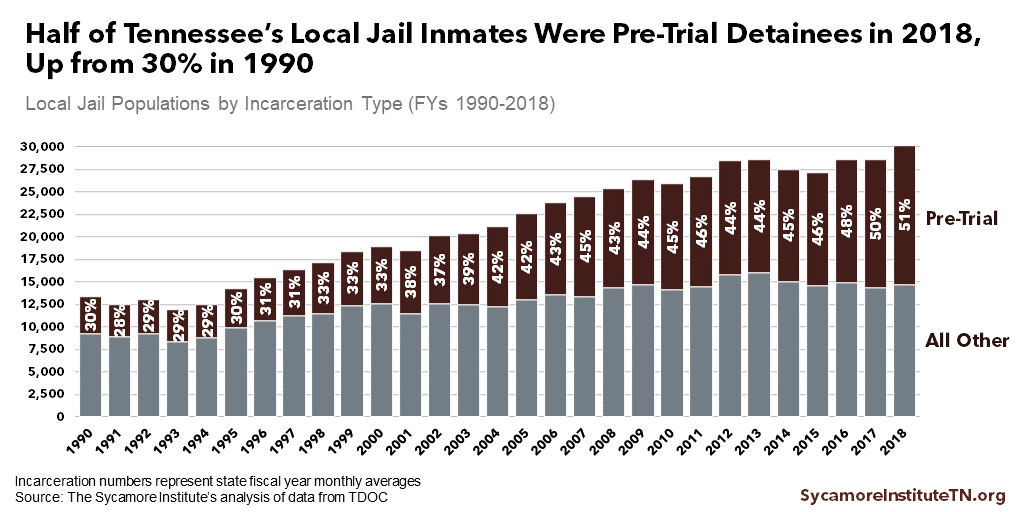
Figure 5
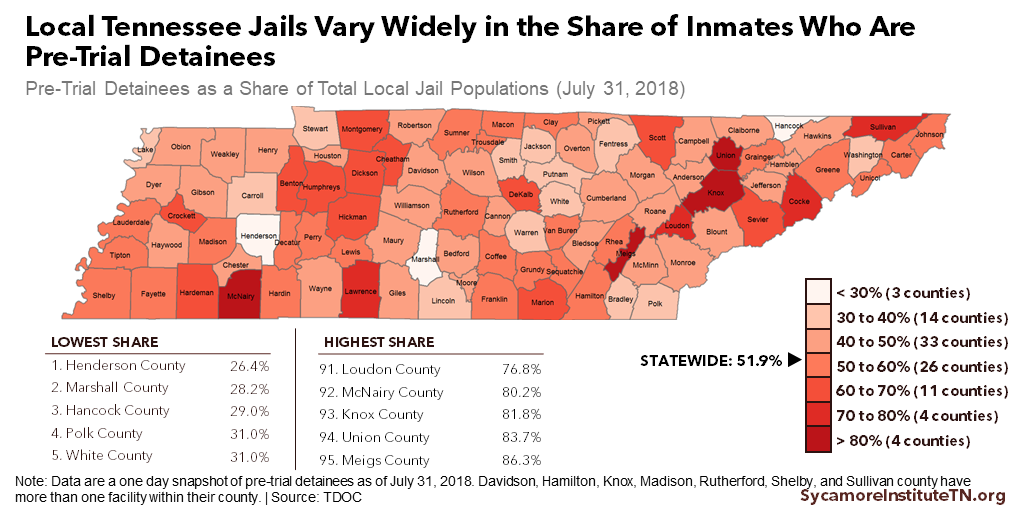
Figure 6
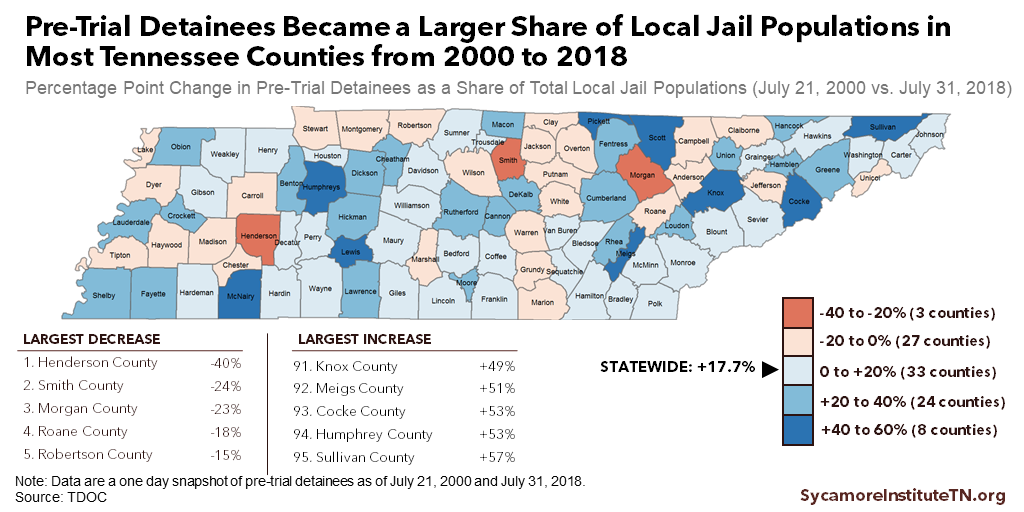
Paying for Pre-Trial Detention in Tennessee
Pre-trial detention directly affects the finances of local governments and households but not Tennessee’s state budget. The state does not reimburse counties for housing inmates awaiting trial on felony charges or convicted felons not yet sentenced. (5) Instead, local governments must cover the costs and often require detainees to pay as well. (6) (7)
State law allows local jails to charge pre-trial detainees a daily fee for the costs of incarceration. (8) (9) Currently, counties can charge up to $60 per day. (9) (10) All 95 counties collected jail fees from inmates in 2015. (11) Davidson County, for example, charged $44 per day until the city council eliminated the fee in 2018. (12) In addition, jails may also charge inmates for supplies, services, and health care. (13)
Local officials can take civil action against inmates who fail to pay local jail fees, such as sending the debt to collections, garnishing wages, or placing liens on property. (10) (14) Until recently, they could also have driver’s licenses revoked. (15)
At least some counties likely cover most of the costs of pre-trial detention out of their own budgets. In FY 2017, for example, Nashville only collected about 4% of the $12 million in jail fees it assessed. The remainder were either waived or unpaid. (16)
How and Why Pre-Trial Detention Occurs
Pre-trial detention can occur for a number of reasons, including when the person charged with a crime:
- Is not eligible for release.
- Fails to meet the conditions of their release.
- Cannot afford the required bail.
- Chooses not to pay the required bail.
For most criminal charges, the law permits the accused to be released from jail before trial. State law ensures everyone the right to release and/or bail unless they are charged with “capital offenses where the proof is evident or the presumption great.” (17) Release can occur either with no conditions (called “release on recognizance” or ROR) or under the bail system, which often includes other requirements in addition to bail. (18) (19)
State law requires judges to consider a number of factors when deciding whether to detain or release and when setting bail. These include the accused’s personal and community ties, mental condition, prior record, probability of conviction, flight risk, finances, and the risk of danger to the community. (20) (18)
If ultimately convicted, any time a person spent in jail before trial counts toward their sentence. (21) As a result, some individuals may choose to forgo release in order to start earning time towards any sentence they may receive.
The Bail System
The bail system seeks to ensure alleged offenders who are released appear for trial. If a judge sets bail, the accused can obtain release by paying that amount in cash or through a surety bond. They may have to meet special conditions while released, such as undergoing drug/alcohol treatment if charged with a DUI. (20) If an individual fails to meet their release conditions, bail can be revoked, and they must return to jail until trial. (22)
Under a surety bond, a bondsman agrees to pay the full bail amount if someone fails to appear for trial or meet their release conditions. In exchange, that individual pays the bondsman a non-refundable fee equal to no more than 10% of the bail amount (plus taxes). (23)
*This paper was updated on April 16, 2024 to clarify the comparison population for Tennessee’s pre-trial detainee population growth.
References
Click to Open/Close
- Tennessee Department of Correction (TDOC). Tennessee Jail Summary Reports for 2000-2018. 2000-2018. Accessed from https://www.tn.gov/correction/statistics-and-information/jail-summary-reports.html.
- —. Tennessee Felon Population Updates for 2006-2018. [Online] 2006-2018. Accessed from https://www.tn.gov/correction/statistics-and-information/felon-population-reports.html.
- Bureau of Justice Statistics. Jail Inmates in 2016: Table 3. Characteristics of Confined Inmates in Local Jails. February 22, 2018. https://www.bjs.gov/content/pub/pdf/ji16.pdf.
- Tennessee Department of Correction (TDOC). Tennessee Jail Summary Report: July 2018. 2018. Accessed from https://www.tn.gov/correction/statistics-and-information/jail-summary-reports.html.
- Tennessee Advisory Commission on Intergovernmental Relations (TACIR). Housing Tennessee’s Convicted Felons: Improving Outcomes while Balancing State and County Needs. 2017. https://www.tn.gov/content/dam/tn/tacir/documents/2017HousingTNConvictedFelons.pdf.
- Liu, Patrick, Nunn, Ryan and Shambaugh, Jay. The Economics of Bail and Pretrial Detention. The Hamilton Project. https://www.brookings.edu/wp-content/uploads/2018/12/BailFineReform_EA_121818_6PM.pdf.
- Ortiz, Natalie. County Jails at a Crossroads: An Examination of the Jail Population and Pretrial Release. National Association of Counties. August 2015. http://www.naco.org/sites/default/files/documents/Final%20paper_County%20Jails%20at%20a%20Crossroads_8.10.15.pdf.
- County Technical Assistance Center. Jailers’ Fees. University of Tennessee Institute for Public Service. https://eli.ctas.tennessee.edu/reference/jailers-fees.
- State of Tennessee. TN Code § 41-11-103 (2017). Inmate Reimbursement to the County Act of 1995. 2018. https://law.justia.com/codes/tennessee/2017/title-41/chapter-11/.
- Tennessee General Assembly. Bill Summary for SB 2384/HB 2187. 110th General Assembly. 2018. http://wapp.capitol.tn.gov/apps/BillInfo/default.aspx?BillNumber=SB2384&ga=110.
- Tennessee General Assembly Fiscal Review Committee. Fiscal Note: HB 748-SB 744. [Online] March 25, 2015. http://www.capitol.tn.gov/Bills/109/Fiscal/HB0748.pdf. http://www.capitol.tn.gov/Bills/109/Fiscal/HB0748.pdf.
- Metro Nashville. Resolution RS2018-1054 (as amended). March 7, 2018. https://www.nashville.gov/Metro-Clerk/Legislative/Resolutions/Details/20a15513-6d21-447e-ae58-5a9d65c6ed31/2015-2019/RS2018-1054.aspx.
- State of Tennessee. TN Code § 41-4-142 (2017). 2018. https://law.justia.com/codes/tennessee/2017/title-41/chapter-4/section-41-4-142/.
- —. TN Code § 40-24-105 (2017). 2017. https://law.justia.com/codes/tennessee/2017/title-40/chapter-24/section-40-24-105/.
- —. Public Chapter No. 579 (2018). Mar 5, 2018. https://publications.tnsosfiles.com/acts/110/pub/pc0579.pdf.
- Metro Nashville. Legal Anaysis for RS2018-1054. 2018. https://www.nashville.gov/metroclerk/files/1803/RS2018-1054_Analysis.pdf.
- State of Tennessee. TN Code § 40-11-102 (2017). https://law.justia.com/codes/tennessee/2017/title-40/chapter-11/part-1/section-40-11-102/.
- —. TN Code § 40-11-115 (2017). https://law.justia.com/codes/tennessee/2017/title-40/chapter-11/part-1/section-40-11-115/.
- —. TN Code § 40-11-116 (2017). https://law.justia.com/codes/tennessee/2017/title-40/chapter-11/part-1/section-40-11-116/.
- —. TN Code § 40-11-118 (2017). https://law.justia.com/codes/tennessee/2017/title-40/chapter-11/part-1/section-40-11-118/.
- —. TN Code § 40-23-101 (2017). https://law.justia.com/codes/tennessee/2017/title-40/chapter-23/section-40-23-101/.
- —. TN Code § 40-11-119 (2017). https://law.justia.com/codes/tennessee/2017/title-40/chapter-11/part-1/section-40-11-119/.
- —. TN Code § 40-11-316 (2017). https://law.justia.com/codes/tennessee/2017/title-40/chapter-11/part-3/section-40-11-316/.
Featured image by Thomas Hawk

















